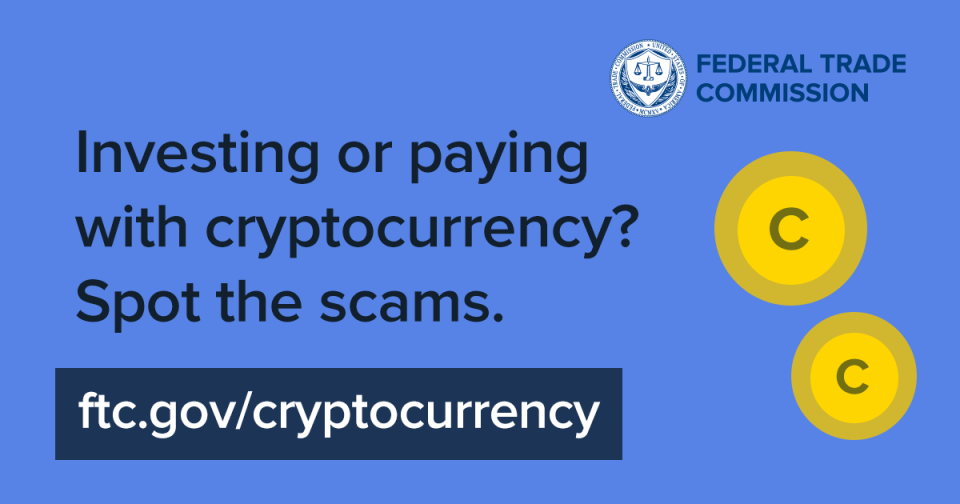If the cryptocurrency craze feels like a tempting way to make money, or you think you’re missing out, read on. Because, according to the FTC’s new data spotlight, scammers are banking on what you don’t know about cryptocurrency — or scammers’ tricks. And that could cost you serious money.
The FTC’s new data spotlight shows crypto is a common way for scammers to steal money, with over 46,000 people reporting losing more than a billion dollars in crypto to scams since the start of 2021. Many crypto scams begin with ads, posts, or messages on social media. And most crypto is lost to investment scams, where scammers get you to “invest” money, promising they’ll make you more — quickly. That’s a lie. You won’t make money and you’ll lose your initial “investment.”
Scammers lurk in online dating apps and on social media, too. These scams might also involve an investment: your new love interest might boast about being rich and offer to help you get started in crypto investing. Don’t do it — those “investments” go straight into their pockets.
Scammers also impersonate major companies and the government. They’ll use messages or pop-ups to claim there’s a problem with your accounts, or a security breach, and the only way to “protect” yourself is to put your money in crypto. Don’t. It’s a scam.
To steer clear of crypto cons:
- Know that only scammers guarantee big payouts or fast, easy money. These lies get you to “invest” — but you won’t get any of your money back.
- Don’t mix online dating and investment advice. If a new online love interest wants to show you how to invest in crypto, it’s a scam.
- Spot the scammers asking you to send crypto. Real companies and government agencies will never tell you to buy cryptocurrency to sort out a problem or protect your money.
For help spotting crypto scams, visit ftc.gov/cryptocurrency. And report scams at ReportFraud.ftc.gov.


Cricket wireless cell phone scams using games to reduce your amount due for cell service is probably a scam and should be investigated. Some games are offering crypto or cash but. Never pay out.
A friend of mine, K. W., NN, VA, is being scammed by someone (calls himself FRED) who says she qualifies for a $300,000 government grant. But, first she has to send him thousands of dollars to pay for fees. This has been going on for 2 yrs. She has sent this person over $10,000 by cash through US mail, gift cards & wire transfers. He first contacted her through Facebook Messenger and now also through her cell phone messages. She's never talked in real time over the phone with him. She's never heard his voice or received anything through the US mail from this person. She refuses to believe her friends or the local police who paid her a visit and warned her this person is a scammer. She's now in a dire financial hole. She is controlled by this scammer. I wish there was a "scam squad" who could visit her. Even the police visit couldn't convince her she was sending her money to a criminal. She even warned the scammer that the police had filed a report with the FBI about him. At this point, there is no hope for her. She is 72 yrs. old and a widow.